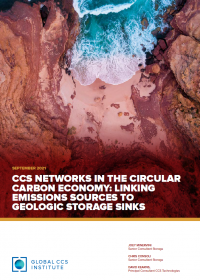Resources
Publications
Our publications, reports and research library hosts over 500 specialist reports and research papers on all topics associated with CCS.
View our Publication Library Disclaimer.
Filter by
CCS Networks in the Circular Carbon Economy: Linking Emissions Sources to Geologic Storage Sinks
5th October 2021
Topic(s): Carbon capture and storage (CCS), CCS networks
Carbon capture and storage (CCS) networks linking emissions point sources to a CO2 transport and storage hub is emerging as the lowest-cost and most cost-effective method of CCS development. As part of the Circular Carbon Economy: Keystone to Global Sustainability series with the Center on Global Energy Policy at Columbia University SIPA, this report reviews emissions and storage basins worldwide, seeking to link clusters of emissions-intensive regions to potential geologic storage basins.
The report is presented in two parts:
- In part one, using a single methodology to characterise global emissions and basins, the authors perform a high-level, regional analysis identifying potential CCS networks by linking suitable storage to intense emissions centres across the globe
- In part two the authors present a conceptual approach to designing a CO2 transport network from distributed sources to a target geological formation for storage, outlining the selection of gas-phase and dense-phase pipeline transport as well as an approach to minimising the cost of pipelines over the network.
Key findings from the report include:
- Potential CCS networks can be identified in almost every industrialised region of the world.
- Those potential networks identified in this report can guide future detailed investigation and planning required for CCS network development.
- Each industrialised region of the world has access to storage resources ranked as highly suitable or suitable.
- The combination of emission sources in proximity to storage sinks means a global portfolio of CCS networks is technically possible. These networks provide the greatest opportunity to rapidly decarbonise large clusters of power and industrial sources.
- Inadequate characterisation of geologic storage resources is the critical limiting factor to CCS network development across the globe.
- Comprehensive national assessments are still needed for the majority of nations. Until these assessments are completed, insufficient understanding of geologic storage resources will remain a significant barrier to CCS network development.
- Pipeline and compression networks require the development of cost models for piping and compression systems for the specific country and local costs of energy and construction. This provides the quantitative basis for decisions in network design.
Disclaimer
The content within the Global CCS Institute Publications, Reports and Research Library is provided for information purposes only. We make every effort and take reasonable care to keep the content of this section up-to-date and error-free. However, we make no claim as to its accuracy, currency or reliability.
Content and material featured within this section of our website includes reports and research published by third parties. The content and material may include opinions and recommendations of third parties that do not reflect those held by the Global CCS Institute.
